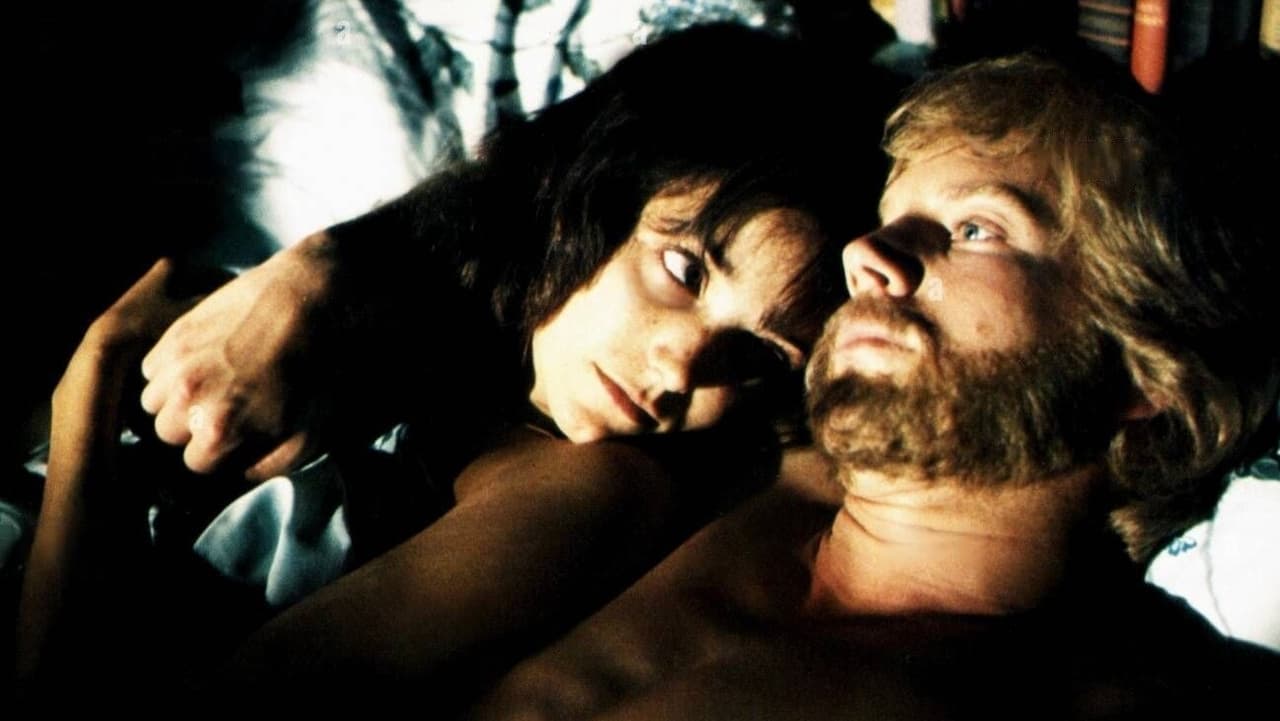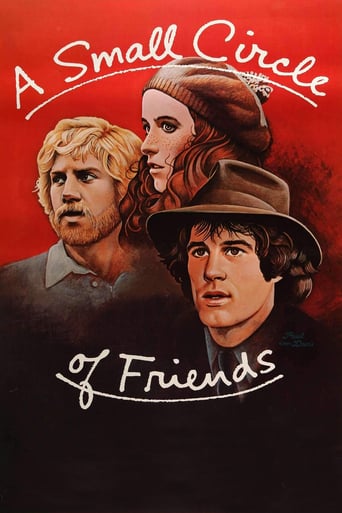



Too much about the plot just didn't add up, the writing was bad, some of the scenes were cringey and awkward,
View MoreThe story, direction, characters, and writing/dialogue is akin to taking a tranquilizer shot to the neck, but everything else was so well done.
View MoreActress is magnificent and exudes a hypnotic screen presence in this affecting drama.
View More.Like the great film, it's made with a great deal of visible affection both in front of and behind the camera.
View MoreI first saw this film on HBO in, I guess, 1981, and it has always stayed with me. I didn't see it again until this week (I'm writing this in late August 2016) and found that it holds up very well. If the filmmakers were aiming to preserve a snapshot of turbulent campus life circa 1970, I think they pulled it off. Those were my times, too, and I was there and I saw this as it was going on. I think this film may have been the first feature to address the era as historical -- as opposed to, say, The Strawberry Statement, a film with many of the same themes as this one, but which was made in 1970.In the wraparound, in "the present," it's been about ten years since Jessie and Nick finished college. I guess my only disagreement with the film is that, given the split between Nick and Jessie after Leo's death -- she's not even aware that Nick returned to Boston, went to Harvard Med and became a psychiatrist -- there's a possibility at the end that they'll get back together. That's a nice ending, but I don't think it reflects real life. In real life, Jessie's cab pulls away, Nick doesn't run after it, and one never phones the other, ever. They are different people now.It also struck me that, here in 2016, it's been almost 50 years since Nick, Leo and Jessie first arrived on campus, and I suddenly felt pretty old when I realized that. Those days are now about as far in the past as the First World War was to the college kids of 1970 -- which is to say, pretty darn far back.(Okay, okay. Maybe Nick and Jessie did get back together. I'd like to think so, anyway.)
View MoreMovie that takes place at Harvard University in Cambridge MA from 1967 to 1971. Three students are starting at Harvard. Nick (Jameson Parker)-tall, handsome, muscular and serious; Leo (Brad Davis) a rebel who lashes out at everything) and Jess (Karen Allen) a sweet, serious and intelligent woman. Both Nick and Leo fall in love with Jess at various times and the film follows them through the four years at school and we see them change--in good ways and bad.This was filmed in Cambridge back in 1979. I remember because I grew up in Arlington--a town that borders Cambridge. I know what Harvard Square and Harvard University looked like back then and it was really great to see it captured on film. Also we see the great Orson Welles Cinema that was in Cambridge--a wonderful art house theatre that burnt down in 1985. I remember catching in a totally empty movie theatre in Boston back in 1980. The fact that it was locally filmed was advertised to the hilt--but nobody came. I can't see why because I LOVED it. I found it totally believable with interesting characters and situations. Seeing it again now all these years later I'm not as totally impressed with it as before. I found the situations and dialogue clichéd and too many unexplained events--WHY was that building chained shut at Harvard and the lottery wasn't explained either. Also, sadly, Parker is a terrible actor. He's tall, handsome and muscular but says every line with a blank look on his face. I seriously didn't know HOW to take some of his dialogue! Still, I DO like the film and recommend it. Allen and Davis give GREAT performances; it moves quickly (I was never once bored); the scenery is beautiful; the music score was incredible (it includes an instrumental of "Total Eclipse of the Heart") and it all ends in a totally unrealistic but happy ending. A must see for any Massachusetts residents who love Boston and Cambridge. Also future stars Daniel Stern and Shelley Long have small roles.
View MoreThis film follows the lives of three friends (Davis, Allen, and Parker) as they attend Harvard in the 1960's. They meet, bond, fall in and out of love, and challenge the system during the time of social upheaval and student unrest. Their friendship is complicated when a love triangle develops, and it takes a senseless tragedy to bring them crashing back down to earth.Like many films set in this era, most key events, from LBJ refusing to seek a second term to the rise of the far left terrorist groups, are seen through the eyes of the main characters. But unlike films like 'Forrest Gump,' the historical references feel more organic to the film, and not just points on a timeline.The three leads are very good as well. Through the various ups and downs in their friendships and the world around them, Brad Davis, Karen Allen and Jameson Parker manage to communicate the changes their characters go through over the two decades this film spans. Even though some of the film borders on melodrama, there are enough interesting sections of the film that keep it from becoming trite.But what I liked most about this film was that it doesn't romanticize the counter-culture. It shows the flaws in the idealism and that not everyone who was against the war was an enlightened peace loving flower child. But it also shows the good things. Like the sense of community, protest through art, and an embracing of love over violence. 'A Small Circle of Friends' manages to show that the hippies were individuals making their own choices and dealing with the consequences, and not some giant smelly organism that shared a collective consciousness.
View MoreThe most resonant element of director Rob Cohen's film is the music score by Jim Steinman, which includes the melody that was later recorded as Total Eclipse of the Heart. Otherwise this tale of a supposed menage-a-tois between Harvard university students Brad Davis, Karen Allen and Jameson Parker is as dramatic as the cartoon opening and closing sketches. The screenplay by Ezra Sacks attempts coverage of the Vietnam era from 1967 to 1971 from a student activist point of view, but the tri-romance hardly seems from the same era since it isn't until towards the end that there is any suggestion of bigamy. There is also even less suggestion of homosexuality interest between Davis and Parker. When the 3 finally go into the same bedroom, the camera is left outside and the door closed. Their lack of involvement in activism is paralled with the radicalisation of a Texan boy scout who comes to Harvard at the same time and ends up a terrorist, and highlighted by a campus riot that comes out of nowhere. Even the Vietnam connection as a comment on the relationship and vice versa doesn't work. Sacks opens with Parker reuniting with Allen in "the present"before we start flashbacking to 1967, with Davis' absence pre-empting the outcome, and Cohen supplies matching love scene montages. Davis' has steam so apparently is more erotic and ends abruptly, whilst Parker's is set to Chances Are and ends more positively. Sacks has 2 lines I liked - a technique of breaking into a glass window "I saw it on I Spy or was it The Untouchables", though Cohen repeats it, and "Only men would come up with a draft lottery using balls". Utilising period TV and photographic images - the assassinations of the Kennedy's and Martin Luther King - and a series of bad wigs, the only sense of reality and truth comes in a moment when someone sings the Star Spangled Banner to TV closure. Davis has the impossible charming/wild man role, not helped by his looking older than the others, and the best he can do is stare child-like for vulnerability. Allen doesn't have a strong screen persona so it's easy to think one is watching Amy Irving or Janet Margolin or Brooke Adams. Of the 3, Parker probably comes off best even when saddled with a Colonel Sanders look. His character's basic dullness is probably the reason he needs to be reunited with Allen. Even when the competition is Davis, anyone that prefers to experiment with rats rather than go to an Ingmar Bergman film is definitely worth reconsidering as a partner. Watch for Shelley Long as a photographer, and Daniel Stern, billed as Dan.
View More